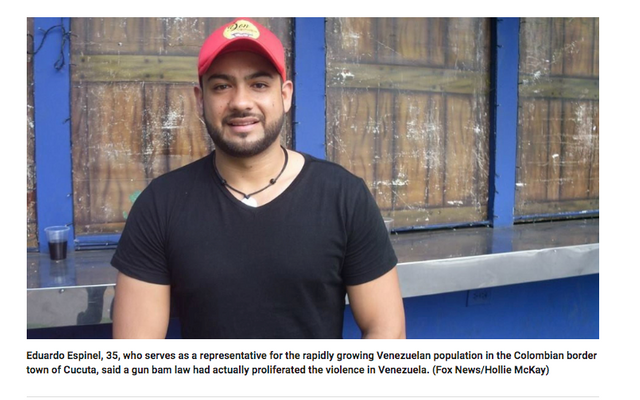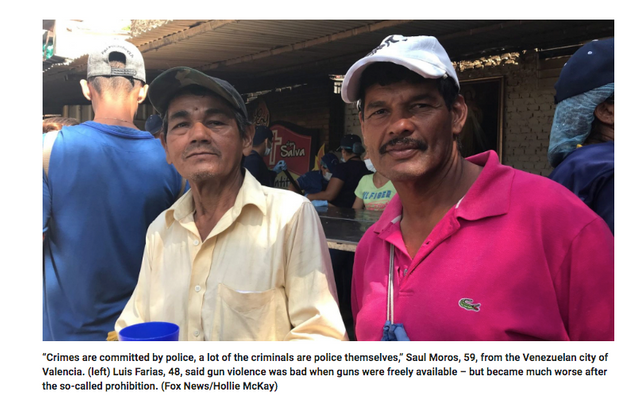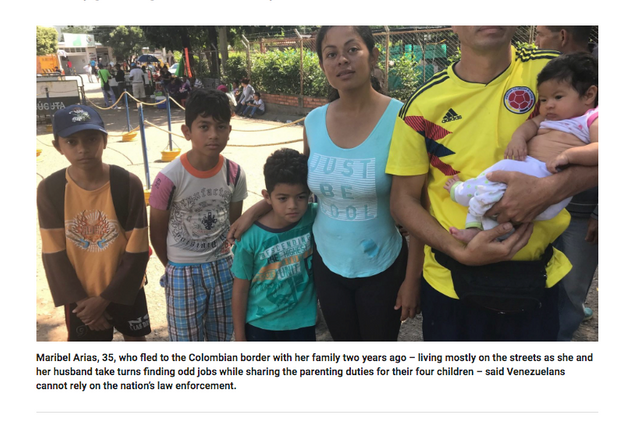
“Guns would have served as a vital pillar to remaining a free people, or at least able to put up a fight,” Javier Vanegas, 28, a Venezuelan teacher of English now exiled in Ecuador, told Fox News. “The government security forces, at the beginning of this debacle, knew they had no real opposition to their force. Once things were this bad, it was a clear declaration of war against an unarmed population.”
Under the direction of then-President Hugo Chavez, the Venezuelan National Assembly in 2012 enacted the “Control of Arms, Munitions and Disarmament Law,” with the explicit aim to “disarm all citizens.” The law took effect in 2013, with only minimal pushback from some pro-democracy opposition figures, banned the legal commercial sale of guns and munitions to all - except government entities.
Chavez initially ran a months-long amnesty program encouraging Venezuelans to trade their arms for electrical goods. That year, there were only 37 recorded voluntary gun surrenders, while the majority of seizures - more than 12,500 – were by force.
The punishment for illicit carrying or selling a weapon now is 20 years behind bars.
“Venezuelans didn’t care enough about it. The idea of having the means to protect your home was seen as only needed out in the fields. People never would have believed they needed to defend themselves against the government,” Vanegas explained. “Venezuelans evolved to always hope that our government would be non-tyrannical, non-violator of human rights, and would always have a good enough control of criminality.”
He said it didn’t take long for such a wide-eyed public perception to fall apart. “If guns had been a stronger part of our culture, if there had been a sense of duty for one to protect their individual rights, and as a show of force against a government power – and had legal carry been a common thing – it would have made a huge difference,” he lamented.
Since April 2017, almost 200 pro-democracy protesters in Venezuela – armed mostly with stones – were shot dead by government forces in brutal retaliation to their call to end the oppressive socialist regime. The once oil-wealthy nation has continued its downward spiral into financial ruin, extreme violence, and mass human rights violations. An estimated three million Venezuelans have been forced to flee since 2015.
“Venezuela shows the deadly peril when citizens are deprived of the means of resisting the depredations of a criminal government,” said David Kopel, a policy analyst, and research director at the Independence Institute and adjunct professor of Advanced Constitutional Law at Denver University. “The Venezuelan rulers – like their Cuban masters – apparently viewed citizen possession of arms as a potential danger to a permanent communist monopoly of power.”
lthough the bill was sold to the population as a hardline effort to improve security, and sharply reduce crime, many now point to Venezuela as a case study for how gun prohibition can actually produce the opposite effect.
The violent crime rate, already high, soared. Almost 28,000 people were murdered in 2015 – with the homicide rate becoming the world’s highest. Compare that, according to GunPolicy.org – an international firearms prevention and policy research initiative – to just under 10,000 in 2012, and 6,500 thousand in 2001, the year before Chavez came to power.
The total number of gun deaths in 2013 was estimated to 14,622, having steadily risen from 10,913 in 2002. While comprehensive data now goes unrecorded by the government, in September this year, Amnesty International declared Venezuela had a murder rate “worse than some war zones” – 89 people per 100,000 people - and three times that of its volatile neighbor Brazil.
Much of the crime has been attributed by analysts to government-backed gangs – referred to in Spanish as “collectivos” – who were deliberately put in place by the government.
It was what the controllers were trying to do here in the United States with the Mara Salvatrucha, also known as MS-13, is an international criminal gang that originated in Los Angeles, California, in the 1970s and 1980s.The gang later spread to many parts of the continental United States, Canada, Mexico, and Central America, and is active in urban, suburban, and rural areas.
“They were set up by the government to act as proxies and exert community control. They're the guys on the motorcycles in the poor neighborhoods, who killed any protesters,” said Vanessa Neumann, the Venezuelan-American president and founder of Asymmetrica, a Washington, D.C.-based political risk research and consulting firm. “The gun reform policy of the government was about social control. As the citizenry got more desperate and hungry and angry with the political situation, they did not want them to be able to defend themselves. It was not about security; it was about a monopoly on violence and social control.”
So ** Venezuelan citizens were stripped of their legal recourse to bear arms, the “collectivos” – established by Chavez when came to power – were legally locked and loaded.**Deemed crucial to the survival of the socialist dictatorship, the “collectivos” function to brutally subjugate opposition groups, while saving some face as they aren’t officially government forces, critics contend.
Eduardo Espinel, 35, (the first photo at top of this article) who serves as a representative for the rapidly growing Venezuelan population in the Colombian border town of Cucuta – having fled his ailing nation two years ago under the threat of being kidnapped by local gangsters – said the law had proliferated the violence by allowing the collectivos to freely and legally shoot and kill.
“Everyone else but the common citizen. This law asks for the disarming of the common people, but everyone else can carry,” Espinel said. “The kind of law might make sense in a normal country, but in Venezuela, it makes no sense. People are faced with crime and have no easy means to defend themselves.”
“The people of Venezuela should have rights for gun carrying because there is just too much crime and people should have the right to defend themselves because the justice system is not working,” Arias asserted. “If you call the police, the police come only if they want. If they capture the criminal maybe they will take away whatever they stole, but they normally go free again. It’s a vicious cycle.”
Some experts contend many of the weapons and ammunition used by gangsters were once in the hands of government forces, and obtained either through theft or purchase from corrupt individuals.
Sounds similar to a situation here in the United States and Mexico called Fast and Furious!
According to Newsmax,
"Fast and Furious" started as a way to capture drug dealers in violent Mexican drug cartels. It ended as part of a scandal involving the Barack Obama presidency that had to be wrapped up following unnecessary deaths.
Here are eight facts about the failed operation that many people aren't aware of.
- The project that became known as Fast and Furious began in November 2009 and took place out of the Phoenix office of the Bureau of Alcohol, Tobacco, Firearms and Explosives' (ATF) office.
Gun-buyers, many of whom the feds suspected were criminals, were permitted to take firearms purchased in the U.S. and walk into Mexico without interference from agents; the intention was that once the guns were sold to powerful drug cartels, the ATF would later trace the firearms. Whistleblowers and investigators, however, found no attempt to trace the guns.
Some ATF agents became concerned the weapons were being used for crimes. On Dec. 14, 2010, U.S. Border Patrol agent Brian Terry was killed during a gunfight. Guns in the shootout were involved in the Fast and Furious operation, it was later learned.
More than 2,000 guns were sold to suspected criminals thought to be linked to Mexican drug gangs in the two years of the operation under the Obama presidency.
A similar operation took place years before under the Bush administration. Called "Operation Wide Receiver," it also failed in tracking down gun and drug traffic, Bloomberg Businessweek reported.
Agents came forward in 2010 to speak with Sen. Charles Grassley, a Republican from Iowa who was a member of the Senate Judiciary Committee. Grassley began to work with GOP Rep. Darrell Issa of California, who chaired the House Committee on Oversight and Government Reform. ATF director Ken Melson, who would later be moved to a different position, began talking secretly with Grassley and Issa.
Following moves by the White House to use executive privilege in an attempt to halt emails related to the case, and contempt of Congress charges against Attorney General Eric Holder in 2012, many documents were finally handed over to Issa’s House Oversight Committee in November 2014.
Emails released to Judicial Watch, a group that filed suit to obtain legal documents from the Justice Department, show Holder’s direct involvement with officials throughout the Justice Department and the ATF in how to handle congressional inquiries and ways to format talking points about Fast and Furious.
The operation started to fall apart inside as U.S. Attorney Dennis Burke, who headed the Phoenix office, became angry with Special Agent John Dodson for reporting on the bungled program before Congress.
Burke, who was later forced to resign in 2011, leaked information about Dodson’s activities in the operation to Fox News. An inspector general’s report cited Burke’s actions in violation of Justice Department policy.
- It has been alleged by the National Rife Association and the New American that the killing of hundreds of Mexicans and even some U.S. law enforcement officers because of the Fast and Furious program was going to be used by the Barack Obama administration as an excuse for more gun control.

Oh what a tangled web these socialists. . .really communists weave. They think they are above reproach and accountability! Do you think they are?
Is there a Clear lesson to be learned here? Is there an obvious danger if innocent people are left without any protection?
Is it wise to trust a government who has been shown to be corrupt to protect us?
What are their response times?

How would they be able to guarantee the weapons were not still in the hands of the criminals?
How are their "gun controls" they already have working?
Wasn't the Texas Church shooter banned from having weapons? How did he get through their "controls, checks, gun laws?"
Do you see the glaring dichotomy?
Let me know in the comments below. Far more information inside the following sources. Godspeed!
Sources,
https://www.foxnews.com/world/venezuelans-regret-gun-prohibition-we-could-have-defended-ourselves
https://www.newsmax.com/FastFeatures/barack-obama-scandal-atf-fast-and-furious/2014/12/28/id/613434/
https://nypost.com/2016/05/21/the-scandal-in-washington-no-one-is-talking-about/
Downvoting a post can decrease pending rewards and make it less visible. Common reasons:
Submit
Curated for #informationwar (by @commonlaw)
Our purpose is to encourage posts discussing Information War, Propaganda, Disinformation and other false narratives. We currently have over 8,000 Steem Power and 20+ people following the curation trail to support our mission.
Join our discord and chat with 200+ fellow Informationwar Activists.
Join our brand new reddit! and start sharing your Steemit posts directly to The_IW!
Connect with fellow Informationwar writers in our Roll Call! InformationWar - Contributing Writers/Supporters: Roll Call Pt 11
Ways you can help the @informationwar
Downvoting a post can decrease pending rewards and make it less visible. Common reasons:
Submit